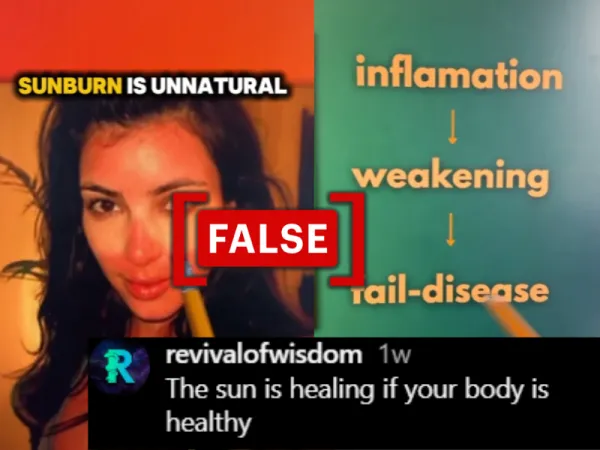By: Siri Christiansen
June 25 2024
 Source: Instagram/Screenshots/Modified by Logically Facts.
Source: Instagram/Screenshots/Modified by Logically Facts.
A sunburn is triggered when UV light damages skin cell DNA, not by your diet.
The claim
An Instagram reel (archived here) with over 437,000 views claims that the sun doesn't cause sunburn; seed oils do.
Seed oil is an umbrella term for vegetable oils like corn, canola (rapeseed), soybean, and sunflower oil. They are commonly found in processed foods such as store-bought biscuits, french fries, and salad dressings, or as at-home cooking oils in the store.
"When there are seed oils within your skin tissue, the sun's rays boil it, and this causes your skin to become burnt," a person in this video claims. "The sun is not bad for you, it's only bad for you if your body is unhealthy. Seed oils cause inflammation, and every time you inflame an organ, it weakens it, and every time you weaken it, over time, this will cause failure or disease."
The person also says sunburn can be avoided by switching seed oils to "alkaline oils" like coconut oil, olive oil, avocado oil, grapeseed oil, hemp seed oil, and sesame seed oil.
This is part of a broader narrative on social media where sun exposure is portrayed as harmless.
"Common myth; being in the sun is bad for you," a wellness influencer says in a TikTok video with over 289,000 views. A similarly viral video claims that skin cancer is instead caused by toxins, bad diet, and stress – not the sun.
(Source: TikTok/Screenshots/Modified by Logically Facts)
The short answer to this is no, your diet doesn't cause sunburn, and there are no legitimate studies on this correlation. But first, let's unpack how this claim started.
Seed oils aren't inflammatory…
The rationale is that seed oils contain high levels of a specific omega-6 fatty acid called linoleic acid. When ingested, linoleic acid is converted into arachidonic acid, which acts as a building block for inflammation-causing compounds. Wellness influencers claim this inflammation causes a range of ailments, including cancer, heart disease, asthma, infertility, and now sunburn.
Claims like these generally come from single studies – like this one from the University of California, where researchers fed mice a diet high in soybean oil for up to 24 weeks and found that it led to a form of inflammatory bowel disease. However, as this fact-check by the Seattle Times points out, the positive correlation has only appeared in studies on rodents. Studies on humans have not been able to prove the same link between linoleic acid and inflammation, instead finding that a higher intake of omega-6 fatty acids is safe and beneficial when part of a low-saturated-far, low-cholesterol diet.
Meta-analyses, which are systematic reviews that pool findings from several studies, have also not found a link between linoleic acid and inflammation.
A 2011 review of peer-reviewed clinical trials on the impact of linoleic acid on changing tissue arachidonic acid in human adults found that a six-fold increase in linoleic acid intake did not result in an increase in arachidonic acid levels. A 2017 systematic review and meta-analysis of 30 randomized controlled studies involving 1,377 adults also did not find that linoleic acid intake had a significant effect on the blood concentrations of inflammatory markers.
…and diets don't cause sunburn, either way
Because there is no solid scientific evidence to link seed oils to inflammation in humans, there is nothing to link seed oils to sunburn. But the idea that avoiding inflammatory foods can protect you from sunburn – a theory that has circulated on social media for at least a year now – is also false.
Sure, eating certain antioxidant-rich foods does promote skin health. Green tea, for example, can help reduce inflammation and damage to the skin, and strawberries contain sun-protective polyphenols. But this, experts underlined and emphasized to Business Insider, is not a substitute for sunscreen.
That's because several decades of research link sun exposure to sunburn, and foods, whether inflammatory or antioxidant-rich, are not part of the equation.
In fact, sunburn is an immune response that activates when ultraviolet rays from the sun hit the skin and induce a mutation of skin cell DNA. The redness and pain you experience are part of a "programmed cell death" where the mutated skin cell is eliminated to protect the body from cancer.
That's why organizations like Cancer Council say there's "no such thing as a 'safe' tan." Even if all you end up with is a bronzed glow, it's still a sign of cell damage that could put you at risk of skin cancer.
The verdict
Seed oils don't cause inflammation in the human body, as the post suggests – but regardless, sunburn is an immune response to damage of skin cell DNA, and food doesn't play any role in that. Therefore, we have rated this claim as false. (PS: Please wear sunscreen!)